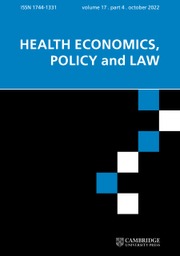Crossref Citations
This article has been cited by the following publications. This list is generated based on data provided by
Crossref.
2011.
Moral Leadership in Medicine.
p.
66.
Littlejohns, Peter
Clark, Sarah
and
Weale, Albert
2012.
Social values in health priority setting: a conceptual framework.
Journal of Health Organization and Management,
Vol. 26,
Issue. 3,
p.
293.
Wranik, Dominika
2012.
Healthcare policy tools as determinants of health-system efficiency: evidence from the OECD.
Health Economics, Policy and Law,
Vol. 7,
Issue. 2,
p.
197.
G. Stokou, Eleni
Vozikis, Athanassios
and
P. Chondrocoukis, Gregory
2013.
Cost-Sharing as a Financing Mechanism in the Greek Primary Health Care: An Assessment from the Managers’ Perspective.
Journal of Finance and Economics,
Vol. 1,
Issue. 1,
p.
11.
Hyry, Hanna I
Roos, Jonathan CP
Manuel, Jeremy
and
Cox, Timothy M
2013.
The legal imperative for treating rare disorders.
Orphanet Journal of Rare Diseases,
Vol. 8,
Issue. 1,
p.
135.
Wilkinson, Dominic
and
Savulescu, Julian
2018.
Cost-equivalence and Pluralism in Publicly-funded Health-care Systems.
Health Care Analysis,
Vol. 26,
Issue. 4,
p.
287.
Guy, Mary
2019.
Between ‘going private’ and ‘NHS privatisation’: patient choice, competition reforms and the relationship between the NHS and private healthcare in England.
Legal Studies,
Vol. 39,
Issue. 3,
p.
479.
Oliveira, Luciane Cristina Feltrin de
Nascimento, Maria Angela Alves do
and
Lima, Isabel Maria Sampaio Oliveira
2019.
O acesso a medicamentos em sistemas universais de saúde – perspectivas e desafios.
Saúde em Debate,
Vol. 43,
Issue. spe5,
p.
286.
Färdow, Joakim
Broström, Linus
and
Johansson, Mats
2019.
Co-payment for Unfunded Additional Care in Publicly Funded Healthcare Systems: Ethical Issues.
Journal of Bioethical Inquiry,
Vol. 16,
Issue. 4,
p.
515.
Färdow, Joakim
Broström, Linus
and
Johansson, Mats
2021.
Responsibility for Funding Refractive Correction in Publicly Funded Health Care Systems: An Ethical Analysis.
Health Care Analysis,
Vol. 29,
Issue. 1,
p.
59.
Duckett, Stephen
2021.
The problematic place of private payment for healthcare in Australia.
Healthcare Management Forum,
Vol. 34,
Issue. 4,
p.
225.
Tapager, Ina
Hansen, Kristian Schultz
and
Vrangbæk, Karsten
2022.
Conceptualising equity in the impact evaluation of chronic disease management programmes: a capabilities approach.
Health Economics, Policy and Law,
Vol. 17,
Issue. 2,
p.
141.
Smids, Jilles
Bomhof, Charlotte
IJzerman, Maarten
and
Bunnik, Eline
2024.
Whole genome sequencing as a ticket to cancer treatment in the Netherlands: Are inequalities in access to molecular diagnostics unfair?.
Journal of Cancer Policy,
Vol. 41,
Issue. ,
p.
100492.




